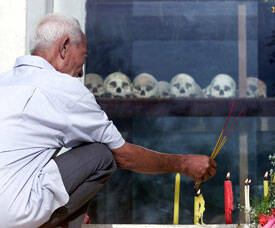The xenophobic Cambodian Communists cleared the nations cities and transported the urban populace to the countryside. The "evacuation" included the old, the hospitalized and children, few of whom were prepared to match the rigors of the march and resettlement. Refugees have chronicled the starvation-level existence, the forced labor and the authoritarian regimen of the rural camps. Executions have included soldiers of the former regime as well as civilians seeking to cross the border into Thailand. In the month of July alone, eyewitnesses have reported the murder of hundreds of civilians, including children, seeking sanctuary in Thailand.
Western reaction has been mute. Few of the activists and legislators who found endless fascination in the varieties of censorship and corruption under the Lon Nol regime have found much to denounce in the Khmer Rouge rule. The American public continues to suffer a self-induced collective amnesia in Indochinese affairs, still wounded by the bitter experience of Vietnam. President Ford and Secretary of State Kissinger have developed no diplomatic initiatives to the Cambodian government and have ignored mention of Indochina save for a few moral denunciations. And the American press apparently finds much greater drama in the threatened execution of a single British writer in Uganda than in the dismemberment of an entire Asian nation.








